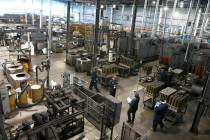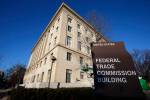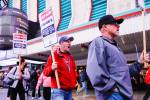Pay study, ad pit unions vs. LV Chamber
Whew! It's not easy keeping all this feuding straight.
First came the salary studies. Then followed a provocative advertisement. A sternly worded letter went out next. Now, two groups representing businesspeople and public employees' unions have squared off in the media.
The heated exchange between police, firefighters' and teachers' unions on one side and the Las Vegas Chamber of Commerce on the other comes at the beginning of the biennial state legislative session, during which lawmakers will discuss cutting public workers' pay and raising taxes on businesses.
David Damore, an associate professor of political science at the University of Nevada, Las Vegas, called the rumpus a natural result of tension coming from chamber analyses of public-sector pay. The disagreement shows both sides can cherry-pick data to support their causes, Damore added, and the union's ad was especially ironic because chamber officials have publicly said they'd consider tax increases as part of a solution to Nevada's budget woes. The ad could forge bad blood and hurt the unions' larger goals, he said.
Here's a recap of the hostilities so far.
The chamber commissioned a series of studies that concluded Nevada's public-sector workers rank among the country's most lavishly compensated public employees. Tired of what they felt was merely a series of inaccurate pot shots, unions representing police, firefighters and teachers bought a full-page ad in Sunday's Review-Journal. The ad alleged that chamber executives and salespeople make substantially more than the public workers charged with protecting lives and educating future generations.
In response, chamber Chairman Steve Hill wrote a letter to Nevada legislators on Monday, pointing to problems he saw in the ad's logic. He reiterated findings that local government workers make 30 percent more than state employees doing the same jobs. He also pointed to the state's "generous" pension system and its $6 billion unfunded liability, as well as a $4 billion unfunded liability for state retirees' health insurance.
Hill said the ad's salary comparisons "significantly misrepresent facts," because they compare chamber workers' total compensation to public workers' base pay. That means the public workers' compensation numbers don't include overtime or call-back pay. Nor do they factor in insurance premiums or retirement contributions. Adding those benefits would have pushed compensation stated in the ad "much higher," Hill wrote.
On Tuesday, in the latest salvo, Chris Collins, executive director of the Las Vegas Police Protective Association, dismissed Hill's claims.
Collins wouldn't disclose where the unions obtained salary data for the ad, saying the source of the statistics was "irrelevant." But he said the data's provider assured the groups that those salaries were the "absolute average" for police and firefighters.
Collins added that much of the overtime police earn comes from special events. The hotels, concert venues and other private businesses that host special events pay for the overtime, so he said it's misleading to assert that taxpayers pick up the tab for all extra hours worked.
And Rusty McAllister, legislative lobbyist for Professional Firefighters of Nevada, said fine print in the chamber's own study refutes the group's contention that public workers here receive more compensation than their cohorts in other states take home. Nevada doesn't pay Social Security for its employees, while most other states do. That makes the Silver State's public employee retirement system a veritable bargain measured against other PERS programs, he said.
The disagreements don't end there: Hill wrote that chamber President Kara Kelley's $274,000 annual salary falls in the middle range of pay among other major metropolitan chamber chiefs, even though Kelley oversees the nation's third-largest chamber. What's more, chamber sales representatives earn commissions only, with no salary at all, so they're compensated solely on their results -- a model of the "pay for performance" the chamber advocates, Hill said.
The back-and-forth won't likely affect state legislators' decisions or public opinion, Damore said.
"It's one of those things where you can find the information you want to believe," he said. "If you want to believe public employees are the cause of Nevada's woes, here's a study to show you that. If you think private business is selfish, we can tell you that as well. Psychologically, it's much easier for people to find information they agree with and ignore stuff they don't agree with."
Contact reporter Jennifer Robison at jrobison@reviewjournal.com or 702-380-4512.
Download the full-page ad























